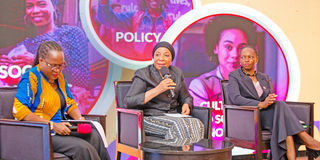Revealed: Grand plan to boost women CEO numbers in Tanzania

Impact Leadership Academy managing partner Zuhura Muro speaks at the launch of the Think Equal Lead Smart (TELS) initiative in Dar es Salaam on April 18, 2024. Others are Association of Tanzania Employers (ATE) chief executive Suzanne Ndomba-Doran (left) and Care International country representative Prudence Masako. PHOTO | GADIOSA LAMTEY
What you need to know:
- Private sector leaders have embarked on a three-year project that seeks to increase the number of women in leadership positions of various companies in a development that will reshape the landscape of gender equality in the country
Dar es Salaam. Private sector leaders have embarked on a three-year project that seeks to increase the number of women in leadership positions of various companies in a development that will reshape the landscape of gender equality in the country.
Dubbed “Think Equal Lead Smart (TELS)”, the programme will be implemented under the CEO Roundtable of Tanzania (CEOrt).
It is designed to foster the full and effective participation of women by creating equal opportunities for leadership across all decision-making platforms.
According to CEOrt, out of its 220 members, only 18 percent are women CEOs. Additionally, among private companies listed on the Dar es Salaam Stock Exchange (DSE), only one out of 28 CEOs is a woman.
Supported by Vodacom Tanzania, the CEOrt, through the first phase of the TELS, aims to positively impact 5,000 women by promoting gender-responsive norms, behaviours, and practices, enhancing leadership capacity, facilitating economic empowerment through financial and digital inclusion, and advocating for policy awareness and development.
Speaking during yesterday’s official launch, the Deputy Minister of Community Development, Gender, Women and Special Groups, Ms Mwanaidi Ali Khamis, commended CEOrt and private sector leaders for their efforts in advancing gender inclusivity in the country.
Currently, statistics show that there has been an increase in women ministers in the last nineteen years, from 15 percent to 37 percent last year. “The government continues to manage the implementation of regional and international agreements aimed at promoting gender equality and women's empowerment in this country,” she said.
Likewise, women MPs have increased from 22 percent to 37 percent.
Ms Khamis added, “I hope that through the project you will reach and benefit many women, especially those who are on the outskirts of the country who are not easily reached so that they too can get the opportunities offered by this project.”
CEOrt executive director Santina Benson said, “We recognise the critical role of women in driving sustainable development and inclusive growth. We aim to bring together stakeholders with the right technical knowledge to deepen an understanding of the gender inequality challenges within the key focus areas and develop solutions to enhance gender inclusion.
“Our goal extends beyond addressing existing disparities; empowering women is not only a moral imperative but also a strategic move, as women in leadership positions are instrumental in driving competitive advantage and transformative change,” she added.
In various sectors such as agriculture, there are indeed a large number of women, but they are not in leadership positions who can make economic changes.
“So we will sit with experts to advise us on what the private sector can do more to stimulate the economy.”
The TELS initiative aims to address challenges for women in, Mid-Level Managers, and at the Community Development (MSMEs) level the first phase aims to conduct a baseline study to identify the main reasons for underrepresentation and attrition and effective methods and interventions at various stages of the leadership journey.
It also focuses on enhancing awareness, reviewing and recommending policies necessary for driving change, and promoting economic empowerment through financial and digital inclusion.
Association of Tanzania Employers (ATE) chief executive Suzanne Ndomba-Doran said many good things have been done but there is still a gap in the policy, especially that of maternity leave, some companies are not complying paying particular attention to the period of six months of breastfeeding after giving birth.





